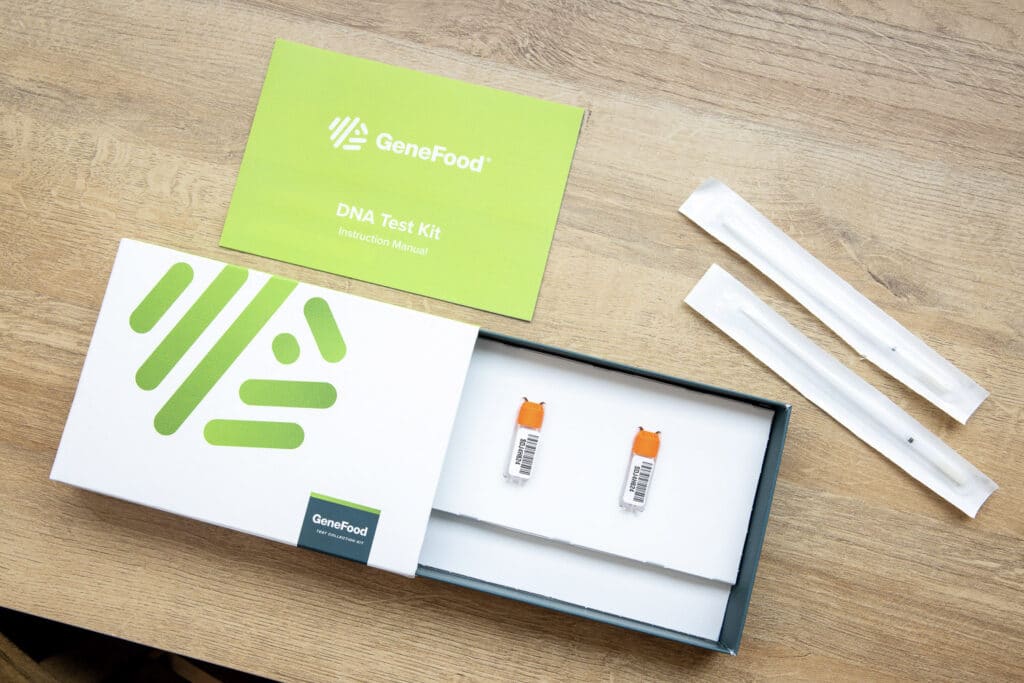The 5 Best Food Intolerance Tests for 2025
Article at a Glance
- Immunoglobulin G (IgG) is the most common type of antibody found in blood circulation. The presence of IgG antibodies tells you very little about what to eat, or what not to eat. It’s more likely that an IgG test tells you about what you have been eating, not what to avoid eating.
- Don’t waste money on tests from companies like Everlywell that sell IgG tests, you will get a laundry list of foods to avoid but very little science.

Contents
I’ve been in the at-home, direct to consumer test kit market for over seven years now. In that time, I have learned a lot about the industry, and specifically personalized nutrition, which is our focus at Gene Food. In this post, I want to share my perspective on testing for food sensitivity as the founder of a health and wellness startup who has also struggled with my own food sensitivity issues in the past.
Out of the gate, let’s establish that food sensitivity is different than food allergy and food intolerance.
- Food intolerance is often driven by genetics. Celiac disease and lactose intolerance are good examples.
- Food allergy is an immediate immune system reaction to a food. Peanuts come to mind as a big one.
- Food sensitivities are murkier, often with a delayed reaction to a food that was once tolerated, and can come and go based on the overall state of a person’s health.
Before someone spends money on food sensitivity testing, it’s wise to rule out food allergy and intolerance.

Gerald Dropped His LDL-C by 100 Points With Diet Alone
Gerald was an ultramarathon runner, but despite his dedication to fitness, he was struggling with rising cholesterol levels, increasing blood pressure, and low energy.
Why IgG based food tests don’t work
Dr. Aaron, our head of research, has always very skeptical of IgG food sensitivity tests due to a lack of scientific rigor.
In our view, a food sensitivity test that gives laundry lists of foods to avoid (as you see with Everylwell’s food sensitivity test) isn’t the solution. We all need to eat, and restrictive diets almost always result in caloric and nutrient deficiency. Rule #1 of a health approach to nutrition is don’t fear the fridge! If there is “nothing” you can eat, look for a root cause upstream from food sensitivity.
Immunoglobulin G (IgG) is the most common type of antibody found in blood circulation. The presence of IgG antibodies tells you very little about what to eat, or what not to eat. It’s more likely that an IgG test tells you about what you have been eating, not what to avoid eating.
In the embedded interview below, I speak with Dr. Joel Evans, M.D. about the problems with most at home food sensitivity tests. At the time we did our interview, Dr. Evans was the medical director at KBMO Diagnostics, an advanced food sensitivity testing provider based out of Massachusetts.
Where to start
Ok, so if IgG is unreliable for food sensitivity testing, where do we start?
In my experience working with thousands of customers at Gene Food over the years, consumers searching for food sensitivity testing are often looking for food intolerance and allergy, and that is the best place to start. Food allergy and intolerance is largely immutable, whereas food sensitivity can ebb and flow based on “upstream” health issues.
To rule out allergy and intolerance and to get to the bottom of actual food sensitivities, the process would look something like this:
- Test for genetic wheat sensitivity
- Test for genetic lactose intolerance
- Test for IgE mediated food allergy
- Test for histamine intolerance
Food allergy and intolerance elicits a different type of reactivity than a sensitivity. As such, there is no point testing for “food sensitivity” until you nail down the foundation of which foods may be causing issues. For example, if you have undiagnosed celiac disease, food sensitivity testing will have no value until the underlying health issue, damage to the small intestine, is addressed.
From there, rather than getting tied up in knots with IgG tests, it will be more valuable for most people to explore the histamine pathways. Why? Because histamine intolerance is increasingly common in adulthood and is associated with “moving target” food sensitivity where people experience reactivity to certain foods some of the time, but not all the time, as the histamine bucket ebbs or flows.
The American Journal of Clinical Nutrition has published an excellent paper on the subject that anyone suffering from mysterious food sensitivity should read.
#1. Gene Food
- Type of test: cheek swab / DNA
- CLIA certified lab: Yes
- Turn-around time: 2-3 weeks
- Issue addressed: Personalized diet & supplements, core food intolerance and histamine pathways
At Gene Food, we can help identify food intolerance to take cafe of step #1 above. Our testing looks at over 150 genetic markers linked to nutrition, including wheat intolerance and the HLA-DQA1 genes associated with celiac disease, lactose intolerance, and histamine intolerance.
For example, the histamine scoring model evaluates genetic markers like the AOC1 gene which is responsible for producing diamine oxidase, the enzyme that clears histamine from the gut.

At Gene Food, we build food sensitivity into our scoring algorithm, with our twenty diet types taking into account lactose intolerance and the histamine pathways as part of the core nutrition plan product.

Get Started With Personalized Nutrition
Gene Food uses a proprietary algorithm to divide people into one of twenty diet types based on genetics. We score for cholesterol and sterol hyperabsorption, MTHFR status, histamine clearance, carbohydrate tolerance, and more. Where do you fit?
#2. Yorktest
- Type of test: Finger prick / blood test
- CLIA certified lab: No
- Turn-around time: 7-10 days
- Issue addressed: Food allergy and environmental allergy
Despite the fact that they aren’t recommended by the American Academy of Allergy, Asthma & Immunology, I see a lot of blogs recommending the same at-home IgG based food sensitivity tests over and over.
Yorktest does something unique to the food sensitivity testing industry, they test for actual IgE mediated food allergy. This test will help you learn if you are dealing with an allergy (IgE mediated) as opposed to a sensitivity, which is step #3 in my list for addressing food sensitivity above.
Rather than throwing 95 foods at the wall to “see what sticks,” Yorktest focuses on 23 core foods known to elicit and allergic response, and also includes 19 environmental allergens. This is a sensible approach and the online reviews indicate several customers have resolved long lasting confusion over the foods that were causing them issues by taking this test.
#3. KBMO Diagnostics
- Type of test: Finger prick / blood test
- CLIA certified lab: Yes
- Turn-around time: 7-10 days
- Issue addressed: Food sensitivities, inflammation, and gut barrier function (leaky gut)
We had the KBMO Diagnostics Medical Director on the Gene Food Podcast a few years ago now. Although the company utilizes IgG testing, they add a second prong to the test that aims to identify foods that cause inflammation, not just the foods that register an IgG response. The proprietary KBMO process is designed to make traditional food testing more reliable than “run of the mill” IgG tests.
#4. Foodmarble
- Type of test: Breath test (hydrogen and methane levels)
- CLIA certified lab: N/A
- Turn-around time: Instant
- Issue addressed: Digestive issues such as SIBO (Small Intestinal Bacterial Overgrowth), IBS (Irritable Bowel Syndrome), and food intolerances (e.g., FODMAPs, lactose intolerance)
Two friends of mine have suffered from gut issues caused by SIBO in the last few years. Once the microbiome falls out of balance in this way, getting back on track can be a major challenge, and food triggers can cause a lot of stress.
Foodmarble offers a unique breath based approach to managing SIBO and IBS. Their monitors give patients real time feedback on hydrogen and methane levels which give clues about the state of the microbiome and how diet is impacting bacterial imbalance. Although more research is clearly needed to validate this approach, it feels like a major upgrade over the traditional IgG testing regime.
#5. Requestatest
- Type of test: cheek swab / DNA
- CLIA certified lab: Yes
- Turn-around time: 3-4 weeks
- Issue addressed: Food intolerance and histamine
Another provider that offers IgE testing, Requestatest can help customers rule out food allergy so they can move on to the true cause of sensitivity. The test is similar to Yorktest but does seem to offer a less comprehensive solution than Yorktest. I list the Requestatest program here to offer another IgE test which can help identify (or rule out) true food allergy.
This Food Allergy blood test looks for allergies to:
- Beef
- Chocolate/Cacao
- Corn
- Eggs (whole)
- Seafood (Mussel, Codfish, Salmon, Shrimp, Tuna)
- Milk
- Peanuts
- Pork
- Soybeans
- Wheat
Why I don’t recommend Viome
There has been a lot of venture capital and investment dollars poured into the microbiome industry in the last 5 years. Some providers, like Zoe Nutrition have gone out of their way to criticize nutrigenomics providers for a lack of scientific validation, and have even done so in scientific papers without disclosing major conflicts of interest. The microbiome space has a lot of buzz, however, when you peel back the curtain on these products what you get is more hype than science. I recently tried Viome. My TMAO results inside the Viome app conflicted with a subsequent blood test from Quest Diagnostic and I was advised to avoid certain plant foods due to vague references to “plant virus.” In my view, direct to consumer microbiome products have a long way to go before they can live up the marketing. These platforms are often designed to sell supplements, which are high margin products.



